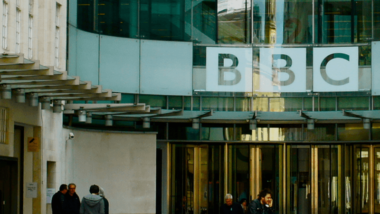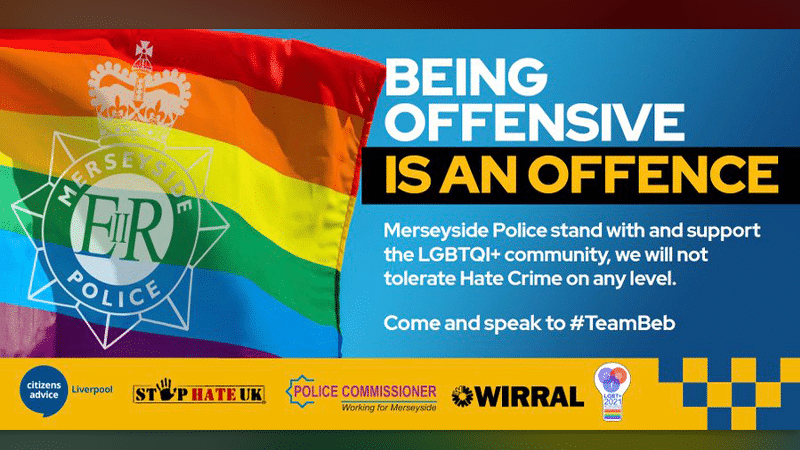Merseyside Police is continuing to mislead the public over hate crimes, despite making an apology over a woefully inaccurate campaign poster.
The force claimed on a public billboard and on social media that “Being offensive is an offence”, adding: “Merseyside Police stand with and support the LGBTQI+ community, we will not tolerate hate crime on any level.”
In 2009, the same police force arrested and charged a Christian couple when a Muslim complained she was offended by their criticism of Islam. The case was dismissed.
Misleading
The force apologised for this latest incident, and removed the post from social media. But on the same day the billboard was launched, Alan McKeon, Sergeant for Community Policing, and Rachel Roberts, the force’s Hate Crime Co-ordinator, made a number of other misleading statements.
Sgt McKeon claimed: “A hate crime is any incident, which may or may not be a crime, that the victim or any other person perceives to be motivated by hostility or prejudice towards any aspect of a person’s identity.”
However, the Government states that “A hate crime is any criminal offence which is perceived by the victim, or anybody else, to be motivated by hostility or prejudice towards someone’s race, religion, sexual orientation, transgender identity or disability” (emphasis added).
Not a crime
The College of Policing guidance on hate crime also states: “Not every reported incident is a crime”.
But Hate Crime Co-ordinator Roberts said: “The most common form of hate crime reported to police is usually name-calling or verbal abuse.”
She added that it was “so important” that people report this as a hate crime, even if they are unsure if a criminal offence has been committed.
‘Ham-fisted’
Toby Young, founder of the Free Speech Union, criticised the force’s messaging, saying: “It’s deeply alarming that Merseyside Police have such a poor grasp of the law.
“As Lord Justice Sedley said in a landmark case in 1999, ‘Free speech includes not only the inoffensive but the irritating, the contentious, the eccentric, the heretical, the unwelcome and the provocative provided it does not tend to provoke violence. Freedom only to speak inoffensively is not worth having.'”

Reality Check: The subjective nature of ‘hate crime’
Former police officer Harry Miller, who won a landmark court battle against Humberside Police over posting ‘transphobic’ tweets, said: “This is the most brazen and ham-fisted effort to silence citizens’ free speech we’ve seen in the two years we’ve been exposing thought policing in the UK”.
He added: “It beggars belief that the police continue to exert a chilling effect on free speech, and to treat the law with such contempt.”the most brazen and ham-fisted effort to silence citizens’ free speech we’ve seen
‘Offended’
In 2009, Christian hoteliers Ben and Sharon Vogelenzang were arrested by Merseyside Police and put on trial after a female Muslim hotel guest complained that she was offended that they criticised Islam during a discussion about religion.
The five minute conversation, which took place in their Liverpool hotel, included discussion over whether Jesus is the Son of God or a prophet of Islam.
The couple, backed by The Christian Institute, were facing a religiously aggravated public order offence and a possible £5,000 fine if found guilty.
But after a two-day hearing, the judge dismissed the case and criticised the police for their handling of the incident.
More on Hate Crime:
‘If you feel offended, report it to us’, urges police force
Video upholding biblical view of sexual ethics reported to police as a ‘hate crime’
Trans hate crime statistics ‘grossly inflated’
Journalist investigated by police for opposition to radical gender ideology


